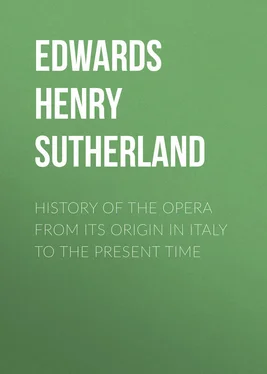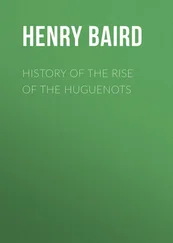Henry Edwards - History of the Opera from its Origin in Italy to the present Time
Здесь есть возможность читать онлайн «Henry Edwards - History of the Opera from its Origin in Italy to the present Time» — ознакомительный отрывок электронной книги совершенно бесплатно, а после прочтения отрывка купить полную версию. В некоторых случаях можно слушать аудио, скачать через торрент в формате fb2 и присутствует краткое содержание. Жанр: foreign_home, music_dancing, foreign_antique, foreign_prose, на английском языке. Описание произведения, (предисловие) а так же отзывы посетителей доступны на портале библиотеки ЛибКат.
- Название:History of the Opera from its Origin in Italy to the present Time
- Автор:
- Жанр:
- Год:неизвестен
- ISBN:нет данных
- Рейтинг книги:4 / 5. Голосов: 1
-
Избранное:Добавить в избранное
- Отзывы:
-
Ваша оценка:
- 80
- 1
- 2
- 3
- 4
- 5
History of the Opera from its Origin in Italy to the present Time: краткое содержание, описание и аннотация
Предлагаем к чтению аннотацию, описание, краткое содержание или предисловие (зависит от того, что написал сам автор книги «History of the Opera from its Origin in Italy to the present Time»). Если вы не нашли необходимую информацию о книге — напишите в комментариях, мы постараемся отыскать её.
History of the Opera from its Origin in Italy to the present Time — читать онлайн ознакомительный отрывок
Ниже представлен текст книги, разбитый по страницам. Система сохранения места последней прочитанной страницы, позволяет с удобством читать онлайн бесплатно книгу «History of the Opera from its Origin in Italy to the present Time», без необходимости каждый раз заново искать на чём Вы остановились. Поставьте закладку, и сможете в любой момент перейти на страницу, на которой закончили чтение.
Интервал:
Закладка:
Again, how could the animation of the market scene in Masaniello be rendered so well as by means of music? In concerted pieces, moreover, the Opera possesses a means of dramatic effect quite as powerful and as peculiar to itself as its choruses. The finest situation in Rigoletto (to take an example from one of the best known operas of the day) is that in which the quartet occurs. Here, three persons express simultaneously the different feelings which are excited in the breast of each by the presence of a fourth in the house of an assassin, while the cause of all this emotion is gracefully making love to one of the three, who is the assassin's sister. The amorous fervour of the "Duke," the careless gaiety of "Maddalena," the despair of "Gilda," the vengeful rage of "Rigoletto," are all told most dramatically in the combined songs of the four personages named, while the spectator derives an additional pleasure from the art by which these four different songs are blended into harmony. A magnificent quartet, of which, however, the model existed long before in Don Giovanni .
All this is, of course, very unnatural. It would be so much more natural that the "Duke of Mantua" should first make a long speech to "Maddalena;" that "Maddalena" should then answer him; that afterwards both should remain silent while "Gilda," of whose presence outside the tavern they are unaware, sobs forth her lamentations at the perfidy of her betrayer; and that finally the "Duke," "Maddalena," and "Gilda," by some inexplicable agreement, should not say a word while "Rigoletto" is congratulating himself on the prospect of being speedily revenged on the libertine who has robbed him of his daughter. In the old drama, perfect sympathy between two lovers can scarcely be expressed (or rather symbolized) so vividly as through the " ensemble " of the duet, where the two voices are joined so as to form but one harmony. We are sometimes inclined to think that even the balcony duet between "Romeo" and "Juliet" ought to be in music; and certainly no living dramatist could render the duet in music between "Valentine and Raoul" adequately into either prose or verse. Talk of music destroying the drama, – why it is from love of the drama that so many persons go to the opera every night.
But is it not absurd to hear a man say, "Good morning," "How do you do?" in music? Most decidedly; and therefore ordinary, common-place, and trivial remarks should be excluded from operas, as from poetical dramas and from poetry of all kinds except comic and burlesque verse. It was not reserved for the unmusical critics of the present day to discover that it would be grotesque to utter such a phrase as "Give me my boots," in recitative, and that such a line as "Waiter, a cutlet nicely browned," could not be advantageously set to music. All this sort of humour was exhausted long ago by Hauteroche, in his Crispin Musicien , which was brought out in Paris three years after the establishment of the Académie Royale de Musique, and revived in the time of Rameau (1735) by Palaprat, in his Concert Ridicule and Ballet Extravagant (1689-90), of which the author afterwards said that they were "the source of all the badinage that had since been applauded in more than twenty comedies; that is to say, the interminable pleasantries on the subject of the Opera;" and by St. Evrémond, in his comedy entitled Les Opéras , which he wrote during his residence in London.
In St. Evrémond's piece, which was published but not played, "Chrisotine" is, so to speak, opera-struck. She thinks of nothing but Lulli, or "Baptiste," as she affectionately calls him, after the manner of Louis XVI. and his Court; sings all day long, and in fact has altogether abandoned speech for song. "Perrette," the servant, tells "Chrisotine" that her father wishes to see her. "Why disturb me at my songs," replies the young lady, singing all the time. The attendant complains to the father, that "Chrisotine" will not answer her in ordinary spoken language, and that she sings about the house all day long. "Chrisotine" corroborates "Perrette's" statement, by addressing a little cavatina to her parent, in which she protests against the harshness of those who would hinder her from singing the tender loves of "Hermione" and "Cadmus."
"Speak like other people, Chrisotine," exclaims old "Chrisard," or I will issue such an edict against operas that they shall never be spoken of again where I have any authority."
"My father, Baptiste; opera, my duty to my parents; how am I to decide between you?" exclaims the young girl, with a tragic indecision as painful as that of Arnold, the son of Tell, hesitating between his Matilda and his native land.
"You hesitate between Baptiste and your father," cries the old gentleman. " O tempora! O mores! " (only in French).
"Tender mother! Cruel father! and you, O Cadmus! Unhappy Cadmus! I shall see you no more," sings "Chrisotine;" and soon afterwards she adds, still singing, that she "would rather die than speak like the vulgar. It is a new fashion at the court (she continues), and since the last opera no one speaks otherwise than in song. When one gentleman meets another in the morning, it would be grossly impolite not to sing to him: – ' Monsieur comment vous portez vous? ' to which the other would reply – ' Je me porte à votre service. '
"First Gentleman. – ' Après diner, que ferons nous? '
"Second Gentleman. – ' Allons voir la belle Clarisse. '
"The most ordinary things are sung in this manner, and in polite society people don't know what it means to speak otherwise than in music."
Chrisard. – "Do people of quality sing when they are with ladies?"
Chrisotine. – "Sing! sing! I should like to see a man of the world endeavour to entertain company with mere talk in the old style. He would be looked upon as one of a by-gone period. The servants would laugh at him."
Chrisard. – "And in the town?"
Chrisotine. – "All persons of any importance imitate the court. It is only in the Rue St. Denis and St. Honoré and on the Bridge of Notre Dame that the old custom is still kept up. There people buy and sell without singing. But at Gauthier's, at the Orangery; at all the shops where the ladies of the court buy dresses, ornaments and jewels, all business is carried on in music, and if the dealers did not sing their goods would be confiscated. People say that a severe edict has been issued to that effect. They appoint no Provost of Trade now unless he is a musician, and until M. Lulli has examined him to see whether he is capable of understanding and enforcing the rules of harmony."
The above scene, be it observed, is not the work of an ignorant detractor of opera, of a brute insensible to the charms of music, but is the production of St. Evrémond, one of the very first men, on our side of the Alps, who called attention to the beauties of the new musical drama, just established in Italy, and which, when he first wrote on the subject, had not yet been introduced into France. St. Evrémond had too much sense to decry the Opera on account of such improbabilities as must inevitably belong to every form of the drama – which is the expression of life, but which need not for that reason be restricted exclusively to the language of speech, any more than tragedy need be confined to the diction of prose, or comedy to the inane platitudes of ordinary conversation. At all events, there is no novelty, and above all no wit, in repeating seriously the pleasantries of St. Evrémond, which, we repeat, were those of a man who really loved the object of his good-natured and agreeable raillery.
Indeed, most of the men who have written things against the Opera that are still remembered have liked the Opera, and have even been the authors of operas themselves. " Aujourd'hui ce qui ne vaut pas la peine d'être dit on le chante ," is said by the Figaro of Beaumarchais – of Beaumarchais, who gave lessons in singing and on the harpsichord to Louis XV.'s daughters, who was an enthusiastic admirer of Gluck's operas, and who wrote specially for that composer the libretto of Tarare , which, however, was not set to music by him, but by Salieri, Gluck's favourite pupil. Beaumarchais knew well enough – and Tarare in a negative manner proves it – that not only "what is not worth the trouble of saying" cannot be sung, but that very often such trivialities as can with propriety be spoken in a drama would, set to music, produce a ludicrous effect. Witness the lines in St. Evrémond's Les Opéras —
Читать дальшеИнтервал:
Закладка:
Похожие книги на «History of the Opera from its Origin in Italy to the present Time»
Представляем Вашему вниманию похожие книги на «History of the Opera from its Origin in Italy to the present Time» списком для выбора. Мы отобрали схожую по названию и смыслу литературу в надежде предоставить читателям больше вариантов отыскать новые, интересные, ещё непрочитанные произведения.
Обсуждение, отзывы о книге «History of the Opera from its Origin in Italy to the present Time» и просто собственные мнения читателей. Оставьте ваши комментарии, напишите, что Вы думаете о произведении, его смысле или главных героях. Укажите что конкретно понравилось, а что нет, и почему Вы так считаете.












